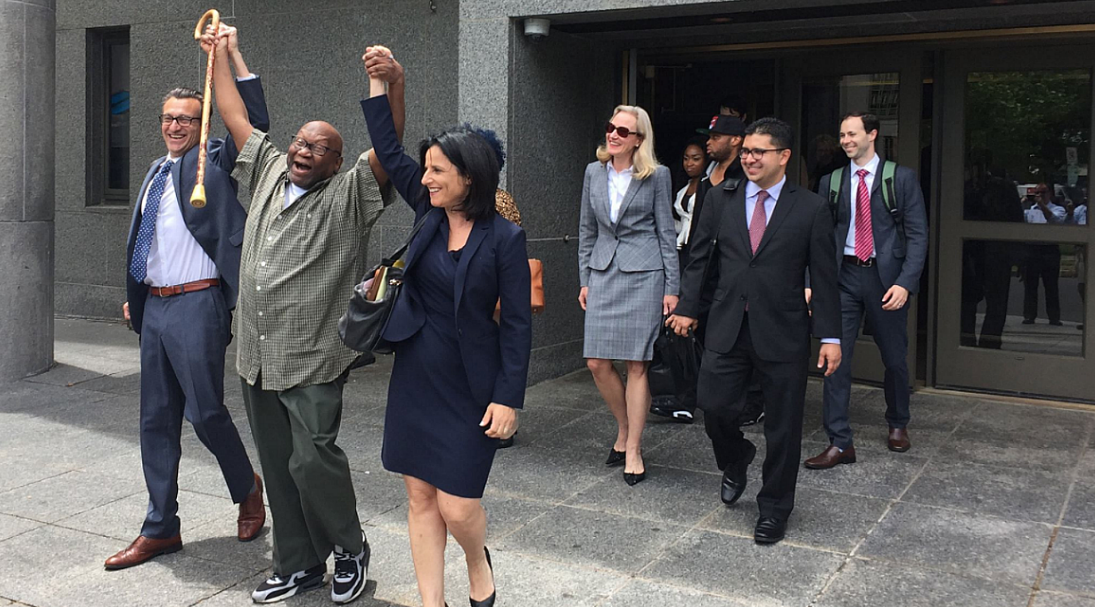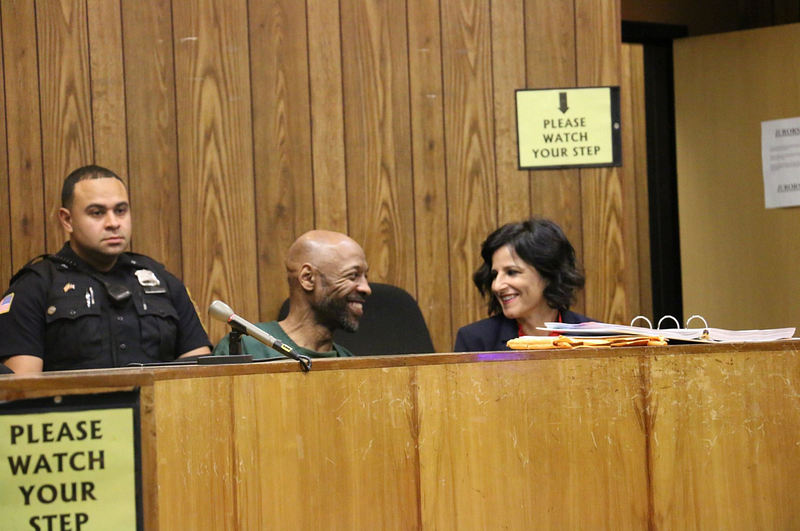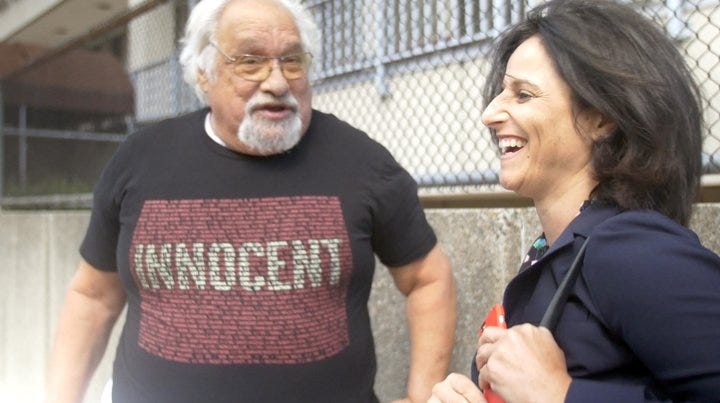
The Innocence Project attorney has helped free 25 unjustly incarcerated prisoners…and counting.
November 8, 2017 was a big day for Eric Kelley. On that cloudless, crisp day, he was released from New Jersey’s Northern State Prison after 24 years of incarceration. Holding the door open for his first steps of freedom was a pretty, petite woman in a sharp suit holding his belongings in a white, plastic Marshalls bag. Kelley, wearing a brown long-sleeved shirt and jeans, held up his arms in victory. And when the cheers from friends and family subsided, he turned and wrapped her small frame in his tall one.
Vanessa Potkin is the Innocence Project attorney who successfully overturned Kelley’s 1993 murder and robbery conviction, with the help of DNA evidence from a green-and-purple plaid baseball hat. Kelley and Ralph Lee (who was represented and freed by Centurion Ministries) had been found guilty of the murder of 22-year-old Tito Merino in Paterson, New Jersey, based on statements they gave to police after they were asked to go to the city’s detective bureau. Though police had been looking for one suspect in Merino’s murder, the two were interrogated separately, for hours on end, giving contradictory statements. Kelley, who was involved in a car accident and suffers from intellectual problems that make it difficult for him to process information, allegedly confessed during the questioning.
Detectives later admitted to feeding Ralph Lee information supplied to them by interrogating Kelley. There are no notes or recordings from his police interview. Then, in 2010, when DNA testing was more advanced, Vanessa and Centurion Ministries were granted permission to retest the baseball hat, found beside Merino’s body, for DNA evidence. After searching the convicted felon database, they got a match — the DNA belonged to Eric Dixon, who had been convicted of a similar robbery of a store close to Merino’s. Dixon also matched the age and physical description of someone a witness mentioned being in the store at the time of the crime.

On the day of his exoneration, Eric Kelley was surrounded by loved ones. While being photographed, they all shouted “freedom!” The newly free man smiled and made silly faces as Potkin joined his family photograph, also sporting a wide grin. He put his arm around her and kissed her head, sticking to her side as he absorbed his new surroundings.
A few days later, Potkin met Kelley again in a shopping mall. The prosecution appealed the vacation of his conviction, but he had been able to post a $20,000 bail while the appeal goes through the courts. They would return on December 11, but Kelley was making the most of his new life. At the mall, Potkin, Melissa Sopher (Vanessa’s paralegal), Kelley, and his daughter were having lunch, waiting for Kelley’s brother to join them. They had about half an hour of free time and were looking for something to do when Potkin and Sopher noticed his nails were unkempt, and took him to get his first manicure.
“His nails were so long and ragged,” Potkin says. “Even though it’s frivolous — I don’t mean to trivialize it, a manicure isn’t going to take away two decades of prison — he came from a place where his needs weren’t met. He was just a number, he was never put first. And his nails looked great.”

“She embodies the spirit of the Innocence Project,” says Barry Scheck, one of the cofounders of the Innocence Project. “Exonerees all love her. She really catches their vitality, and she’s got a terrific sense of humor and a fighting spirit. She gets it.”
Potkin met Scheck and Peter Neufeld in 1992 when she interned with their police brutality practice in New York City. Scheck and Neufeld co-founded the Innocence Project, an organization that helps wrongfully convicted inmates regain their freedom. Since its inception in 1992, the Innocence Project has grown to encompass an 80-person New York staff with organizations in over 60 countries. It has freed over 350 wrongfully convicted individuals as a result of DNA evidence, and has identified 150 alternative perpetrators.
Potkin was born in Chicago but, because of her father’s residency as a doctor, her family quickly relocated to Seattle, where they lived until she was 13. They then moved to West Hollywood, and she now considers herself a California native. In her undergraduate studies at Mills College, a grant allowed her to work with Maxine Waters, the Democratic congresswoman. There, she realized her drive to be a part of policy reform. It was a time of highly publicized police brutality, during the infamous “war on drugs,” and Potkin zeroed in on justice system reform as something that interested her. At the time, though, she wanted to be a politician. A law degree was, she thought, a way to pad her resume. “I saw the prison system as one of the most pressing issues of our time. It wasn’t a war on drugs, it was a war on people of color and poor people.”
Just ask Anthony Wright. When he was only 20, the young black man with an infant son found himself arrested for the 1991 rape and murder of an elderly Philadelphia woman. After serving 25 years for the crime he didn’t commit, his retrial jury acquitted him after less than an hour of deliberations. Wright had a solid alibi, police had illegally obtained a questionable confession, and new DNA evidence proved the guilt of another man, Ronnie Byrd.
“Our criminal justice system needs to be revised. There are situations that should not be,” said Grace Greco, a juror in Wright’s retrial. “How many people have been unjustly incarcerated based on false evidence? It is really a problem, especially when you’re poor and you are black and you have no one to vouch for you.”
Potkin’s work with Rep. Waters also exposed her to another force: legendary lawyer Johnnie Cochran. At the time, he was working on the case of Geronimo Pratt, the Black Panther leader on trial for the murder of Caroline Olsen. Cochran lost the case, but Pratt’s conviction was vacated. Cochran would go on to be a co-founder of Cochran, Neufeld and Scheck LLP, the police brutality litigation company that preceded the Innocence Project.
Now, in Potkin’s office — a room the size of a prison cell filled with case files, blown-up newspaper articles recounting her successful exonerations, and photos of her daughter — she proudly houses a photo of her and Rep. Waters from the early ’90s. It sits on a wooden table, framed by a light green piece of construction paper. She shows it off with a beaming smile: “She’s one of my inspirations.”
In 2000, Potkin became the Innocence Project’s first staff attorney after the organization received a grant to hire one lawyer. She planned to stay for a year, but has spent the last 17 years fighting for the unjustly incarcerated. She is a champion of post-conviction DNA litigation, and has represented and exonerated over 25 people. As one of an eight-person group from various disciplines, she helped publish a 2012 report by the National Institute of Justice called “DNA for the Defense Bar” that serves to increase understanding of DNA science and its place in court. Because of her work, efforts to change policy, and research, she is also a nationally recognized expert on both wrongful convictions and innocence proven by DNA evidence.
“Vanessa doesn’t back down to anybody,” chuckles Gina Papera-Ewing, a former paralegal for the Innocence Project. From 2012 to 2015, she worked with Potkin closely. “Inevitably, she will always find her way around any sort of road block.” Papera-Ewing was 20 years old and trying what she wanted to do post-college. “I got to have a mentor who was such a strong woman, and a strong woman attorney. In a male-dominated profession, it can kind of be daunting sometimes. To have her as a mentor really taught me how to be fearless in very specific ways.”
In addition to fighting for individuals, the Innocence Project seeks to reform the justice system through education, in order to prevent future injustices and wrongful convictions. They focus on incentivized informants (often, prisoners who are given reduced sentences in exchange for incriminating testimony against the accused), inadequate defense, misapplication of forensic science (bite mark science, for example, was heavily relied upon for decades and has since been deemed inadequate), government misconduct, false confessions, and eyewitness misidentification as the main causes of unjust incarcerations. Potkin is also looking to expand the Innocence Project’s case load to include non-DNA cases, where innocence can be proven with other sciences. She recently partnered with a Canadian entomologist (someone who studies bugs) to submit maggot growth and decomposition evidence to prove that the victim was murdered at a time when the accused (and later convicted) was identified to be two hours away.
In addition to fighting for individuals, the Innocence Project seeks to reform the justice system through education. Click To TweetIn that case, 18-year old Kirstin Blaise Lobato was accused of a violent Nevada murder after a troubled life. She had been abused growing up, and was involved in an assault prior to the murder she was convicted of. The prior assault, though, was an act of self-defense, and Lobato boasted about her ability to escape an attack. That same pride, Potkin says, gave the police ammunition to zero in on her client as the perpetrator. “It was tunnel vision, and they saw no other possibility,” she says. As the Innocence Project’s 200th client, Lobato was released from jail on January 3.
The men and women Potkin has exonerated also remain in contact with their one-time attorney. Barry Gibbs had been framed for the 1986 murder of an African American sex worker in Brooklyn. The killing, it turned out, was tied to retired NYPD detective Louis Eppolito, who was later convicted of eight murders and other charges — he and another detective had plotted and carried out killings on behalf of the Mafia.
Gibbs was released from jail in 2005. The night before he was set to be released, Potkin and a coworker ran frantically through K-Mart searching for clothes and other comforts for their client. After his release, they remained friends, and Potkin gave Gibbs another honor — he was her daughter’s godfather. When Gibbs passed away on March 23, The Innocence Project posted an article recounting Vanessa and Barry’s friendship.

Potkin’s 7-year old daughter also makes frequent appearances in the Innocence Project offices. She knows everyone as friends of her mother’s, and she is given a look into the organization’s dynamic — though the legal profession is largely male-dominated, the Innocence Project’s male to female ratio doesn’t reflect that. Only 24% of the staff is male. In fact, Potkin’s daughter offers an entirely new insight — her cousin, a boy, wants to be a lawyer, and Potkin and her daughter were having a conversation about it. “She turned to me and said: ‘Mom, he can’t be a lawyer, he’s a boy. Only women can be lawyers!’” Potkin recalls. “It was an interesting moment for me.”
The subject of Potkin’s Columbia Law School thesis focussed specifically on guilty pleas. Today, 97% of federal cases are resolved with them — in some cases prosecutors are incentivized to resolve cases without a trial — and an overcrowded docket is relieved. But, many of these pleas are coerced, not truthful, or submitted to avoid trial. “Because sentences are so excessive, prosecutors wield power to coerce guilty pleas,” she says. Essentially, a person’s right to a trial is exchanged for a less chaotic courthouse, and for prosecutor rewards. “If you have a system that would shut down if everyone exercised their constitutional right, you have a problem.”
The Innocence Project still has a lot of work to do. One in four American people have a loved one who is incarcerated, but how many are wrongful convictions? A study in the Proceedings of the National Academy of Sciencesfound that 1 in 25 death row inmates is later proven innocent. According to Time Magazine, 166 people were declared innocent in 2016 — and some of them were convicted as far back as 1964. Nineteen were exonerated after they died. This made for an average of three exonerations per week. At the time of writing, the Innocence Project has 200 on the docket for exoneration, and a staggering 6,000 cases in evaluation.

On December 11, Potkin returned to court in Paterson, New Jersey. It was a hearing to update the courts about Ralph Lee and Eric Kelley’s lives while on bail. Lee’s father and Kelley’s younger brother sat in the back of the five-row room, listening as Potkin petitioned for, and was eventually given, permission for Kelley to leave the state of New Jersey to visit the Innocence Project office in Manhattan (both of their current bail statuses require that they stay in their home state). The judge heard that Kelley has a job as a dishwasher at IHOP and that he is doing well with his freedom.
The hearing concludes with an appeal hearing and another update hearing set for February 2018, and the small crowd files out of the courtroom. They hug and catch up for a few minutes, chatting in a circle about the next steps of the case and about holiday plans. After a few minutes, both Lee’s father and his lawyer leave, but the rest of the group piles into two cars — Kelley’s brother Troy and Ralph Lee into Troy’s Mercedes and everyone else into Potkin’s Prius — and head to lunch in Newark. On the way, Kelley and Potkin, both sitting in the front, talk about families and their children, peppered with legal talk.
Eric Kelley and Ralph Lee walk out of prison after 24 years of wrongful conviction.
Lunch, at Newark’s Dinosaur BBQ, is a friendly affair as well. Troy Kelley, the jester of the group, teases Potkin about her taste in music, guessing her favorite band is Hall & Oates. She’s typing out the motion to allow Eric Kelley into Manhattan as she surprises Kelley with her list of favorite musicians — Mary J. Blige, Beyonce, and Whitney Houston. They FaceTime Gina Papera-Ewing as the quiet, observant Ralph Lee and outgoing Eric Kelley take turns sharing their stories of freedom. This behavior, Papera-Ewing says, is what makes Potkin stand out as a lawyer — her clients are also her friends. “I see our clients as people first. It shouldn’t be a revolutionary idea,” Potkin says. “Even if our clients had done what they were convicted of, they’re still humans. People make mistakes.”
“She does this work, and it comes from such a pure place,” Papera-Ewing says. “Vanessa is more than an attorney. She becomes like a friend, like family.” Proof lies in her ongoing relationship with Archie Williams, an inmate at Angola Prison. His was one of Potkin’s first cases as an Innocence Project attorney, and one of the reasons she chose to stay on all of those years ago.
“I told him: I won’t leave the Innocence Project until you’re exonerated. And he’s still in jail.”

